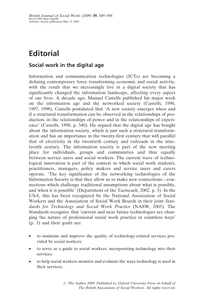This research aims to contribute to a better understanding of strategic collaborations between work-integration social enterprises (WISEs) and for-profit enterprises (FPEs) with the joint objective to improve labour market opportunities for vulnerable groups. We find that most collaborations strive towards integration or transformation in order to make more social impact.
LINK
Article about social work and social policy in the Netherlands. It gives information about the background, history, the meaning of the profession and the different types of professional areas in which the profession is divided. Other subjects are: social work curricula, the European dimension of social work an current challenges for social professionals in the Netherlands.
DOCUMENT

Because social workers respond to local contexts, it is often said that social work is not a global profession. Indeed, social workers adapt their practices to local conditions. However, these local practices are recognised globally. The exchange of these practices and methods enriches social workers, inspires them and strengthens the further development of the profession. To facilitate this exchange, social work has had several international associations and networks for almost a century, which have enabled the sharing of local practices and educational programs. Today, social work works within a basic international framework that guides both professional practice and education. This descriptive article will take the reader through the history of international social work, by mentioning some global social work associations and networks and their achievements. Furthermore, the article will address internationalisation of the social work curriculum and will mention the added values and disadvantages of an international experience abroad. (Includes an abstract in the Slovakian language)
MULTIFILE
Article about social work and social policy in the Netherlands. It gives information about the background, history, the meaning of the profession and the different types of professional areas in which the profession is divided. Other subjects are: social work curricula, the European dimension of social work an current challenges for social professionals in the Netherlands.
DOCUMENT

Paper for the European workshop Social Work Education in Europe: towards a stronger research-orientation, University of Applied Sciences Magdeburg-Stendal, 31 March - 4 April 2004. The paper presents both general and specific aspects of the developing context in social work education in theory and practice according to the changing face of higher education in Europe.
DOCUMENT

During recent decades a strong interest has grown in actively involving service users in social work education, research and policy development. Drawing on a major European Social Fund project, this book presents an overview of inspiring collaborative models that have proven their efficacy and sustainability. Contributions from service users, lecturers and researchers from across Europe provide detailed case studies of good practice, exploring the value framework behind the model and considering their added value from a user, teacher and student perspective. The book concludes with a series of reflective chapters, considering key issues and ethical dilemmas.
DOCUMENT
Inleiding op een themanummer van British Journal of Social Work over sociaal werk in de digitale samenleving.
DOCUMENT

A definition of the concepts ‘multidisciplinairy and transdisciplinary work’ and the different types of reaction of social work towards the emergence of multidisciplinary and transdisciplinary approaches.
DOCUMENT

This article is about a research project focused on the development of a common knowledge base for social work education in the Netherlands. Recent substantial changes in society and social policy were the reason for a reconsideration of the educational content of social work education. A great urgency was established with regard to the adaptation of the study programs, including a higher level of knowledge. The aim of the project was to provide a knowledge base that creates a bridge between theory and practice and between social work practice and the societal context. The project started with an exploration of literature focusing on the significance of knowledge for professional practice and on existing classifications of the knowledge base in social work education. Subsequently a design-based empirical study was carried out using the Delphi-method. Experts agreed about the definition of the knowledge base and about the design requirements: practice-based, science-based, usable and sustainable. After an exploration of the content, a model was developed consisting of seven building blocks (BBs). The common knowledge base has been established by the Dutch Council of Schools of Social Work and is being used as the basis for the body of knowledge in all curricula of social work education in the Netherlands.
LINK